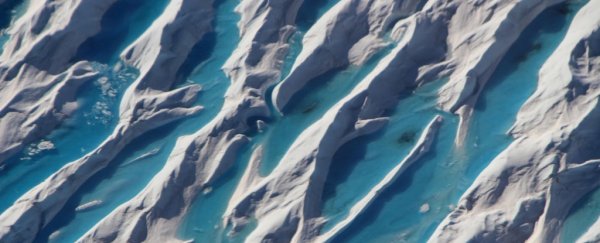It's the hiatus that never happened: an apparent 'slowdown' in rising surface temperatures between 1998 and 2012, which encouraged climate change deniers to label global warming a made-up conspiracy. Even a hoax.
To be clear, thanks to the efforts of scientists, this 'pause' in global warming has been thoroughly debunked, but new research highlights another reason we made the mistake in the first place: missing data.
Atmospheric scientist Xiangdong Zhang from the University of Alaska Fairbanks says one of the historical problems with scientists' measurements of global average surface air temperature (SAT) has been that they're incomplete.
Specifically, a lack of readings taken in the Arctic, due to a shortage of in situ measuring devices, means we haven't been fully accommodating Arctic temperature increases into the global perspective.
To address this, Zhang and fellow researchers analysed temperature measurements taken by buoys drifting in the Arctic Ocean – the International Arctic Buoy Program – and also drew upon updated sea surface data collected by the National Oceanic and Atmospheric Administration (NOAA).
The result, the team says, is the first dataset of surface temperatures that properly takes the Arctic into account during the so-called global warming pause – and it's another nail in the hiatus's coffin.
"We recalculated the average global temperatures from 1998–2012 and found that the rate of global warming had continued to rise at 0.112°C per decade instead of slowing down to 0.05°C per decade as previously thought," says Zhang.
The results also throw into sharp relief just how significantly the Arctic warmed in that period – suggesting its absence in global averages was something that would have helped strengthen the appearance of the non-existent slowdown.
"We estimated a new rate of Arctic warming at 0.659°C per decade from 1998–2014," says Zhang.
"Compared with the newly estimated global warming rate of 0.130°C per decade, the Arctic has warmed more than five times the global average."
The findings build on a dramatic saga of scientific research suggesting the global warming hiatus wasn't what it seemed to be.
Most recently, a study published in January led by researchers at the University of California, Berkeley, backed up NOAA results that attributed the apparent slowdown to errors made in temperature measurements.
NOAA researchers in 2015 had suggested the perceived slowdown in ocean warming was due to a technological transition in how we record temperatures.
As scientists moved from ship measurements to buoy readings (during the years of the hiatus), a 'cold bias' entered the data – because buoys generally record cooler water temperatures than ships, which give off ambient heat that can distort the data.
In lifting the lid on this mistake, the NOAA researchers who discovered the error were met with accusations they had altered their data and were publicly subpoenaed to give evidence about their research – and the mud-slinging continues even now.
The Berkeley research released this year vindicated the NOAA findings – a result one of the original NOAA team described as "not surprising [but] gratifying."
But it just goes to show, whether you're forgetting to adjust for buoy cold biases – or failing to incorporate accurate readings for a region as vast as the Arctic – your conclusions are only as good as your data.
"We have to constantly be vigilant to potential biases in our understanding," one of the Berkeley team, climate scientist Zeke Hausfather, told The Christian Science Monitor in January.
"There is no perfect measurement system, particularly over long periods of time."
For his part, Zhang hopes the new research helps scientists – and anybody else concerned about climate change – not to forget about goings on in the Arctic, as inhospitable and distant as it may be.
"The Arctic is remote only in terms of physical distance," Zhang says.
"In terms of science, it's close to every one of us. It's a necessary part of the equation and the answer affects us all."
The findings are reported in Nature Climate Change.
